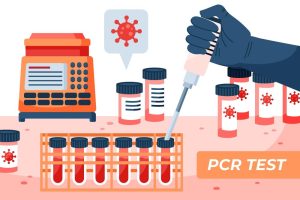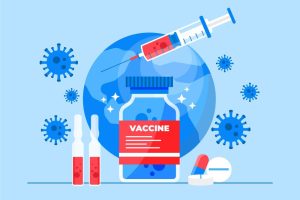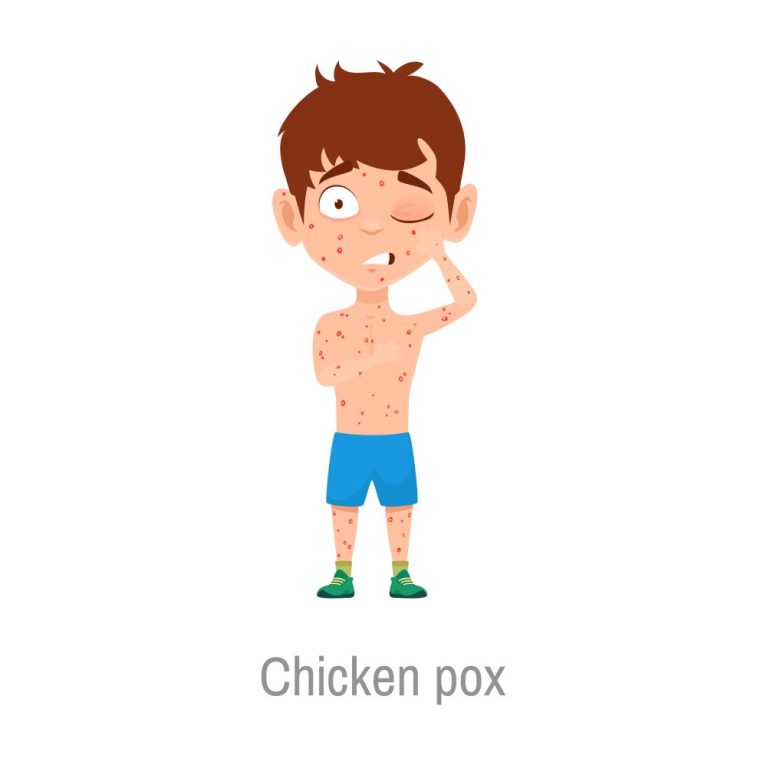Chickenpox is a highly contagious disease caused by the varicella zoster virus. It can be transmitted through direct contact with skin lesions, as well as through coughing and sneezing. The risk of spreading chickenpox is particularly high among students in schools, colleges, and other post-secondary educational institutions due to the increased likelihood of direct contact.
Chickenpox symptoms:
The primary sign of chickenpox is a rash that consists of itchy blisters filled with fluid that eventually turn into scabs. The rash may begin on the chest, back, and face and then spread over the entire body. Most of the infected individuals have a fever, which develops just before or when the rash appears. Other symptoms are:
- Tiredness
- Fever
- Headache
- Loss of appetite
An individual with chickenpox illness is contagious 1-2 days before the rash appears and until all the blisters have developed scabs. Chickenpox generally develops 10-21 days after exposure.
After having chickenpox, the virus might reactivate later in life to create shingles, a painful condition that is frequently characterized by a blistering rash.

Chickenpox diagnosis:
The chickenpox rash is unique. Usually, a history of exposure and the rash’s appearance can be used to diagnose. In rare cases, blood tests or polymerase chain reaction (PCR) tests may be used to detect VZV.

Chickenpox treatment:
Chickenpox can be prevented by vaccination. In the case of chickenpox infection, we can reduce the severity of symptoms by
- Using calamine lotion
- Cut your nails short and try not to scratch to stop the virus from spreading.
- In case you mistakenly scratch a blister, wash your hands for at least 20 seconds with soap and water.
- To relieve a fever, use acetaminophen or non-aspirin medications.
Avoid using aspirin or aspirin-containing products to reduce fever from chickenpox.
A doctor should be consulted if you or someone in your family is exposed to chickenpox and has not been vaccinated.
People who have chickenpox and are more likely to get really sick should take antiviral drugs, including these groups:
- People over 12
- Who has a long-term skin or lung problem
- Women who are pregnant
- People whose immune systems aren’t strong enough
- People who are taking salicylates or steroids for a long time

Chickenpox Home Remedies:
- Rest: Stay hydrated and get enough sleep.
- Hydration: Drink plenty of fluids to prevent dehydration.
- Cool Baths: Oatmeal or baking soda baths help soothe itching.
- Loose Clothing: Soft, breathable fabrics minimize skin irritation.
- Lime juice: Apply diluted lime juice on rashes using cotton.
- Herbal teas: Drink herbal teas like chamomile or ginger tea.
- Cool compresses: Wrap an ice pack in a towel and apply it to the itchy skin.
- Essential oils: Mix coconut oil with lavender or tea tree oil to reduce irritation.
Chickenpox complications:
The complications may include:
- Pneumonia (lung infections)
- Reye syndrome
- Encephalitis (inflammation of the brain)
- Secondary bacterial infections
- Transverse myelitis (inflammation along the spinal cord)
- Cerebellar ataxia (defective muscular coordination)
- Death
Chickenpox prevention:
The varicella vaccine, also known as the chickenpox vaccine, protects against chickenpox. It’s advised for children, teenagers, and adults. The chickenpox vaccine is advised for all children who have not yet contracted the disease. Most people who receive the vaccine are protected for life and will not develop chickenpox.

Chickenpox vs. Shingles
While chickenpox occurs from an initial VZV infection, shingles are caused by the reactivation of the virus in individuals who have had chickenpox before. Shingles results in a painful rash along nerve pathways and is more common in older adults and those with weakened immune systems. The shingles vaccine (Zostavax or Shingrix) is recommended for adults over 50 to reduce the risk.
When to See a Doctor?
Seek medical attention if:
- The rash spreads to the eyes.
- The blisters become excessively red, swollen, or pus-filled (signs of bacterial infection).
- Fever persists beyond four days or is higher than 102°F (39°C).
- Difficulty breathing or confusion develops.
- Pregnant women or immunocompromised individuals get infected.
Faqs:
1. Which doctor treats chickenpox disease?
General practitioners, pediatricians, or infectious disease specialists treat chickenpox disease.
2. Is it possible to get chickenpox more than once?
It is uncommon but possible. Most people who have had chickenpox will develop immunity to the virus and are unlikely to get it again. However, the varicella-zoster virus can reactivate later in life as shingles, a different form of the illness.
3. How long can chickenpox scars fade, and can they be permanently removed?
Chickenpox scars typically begin to fade within a few months, but some may take longer, depending on the severity of the breakout and skin type. Deep or pitted scars may not completely disappear on their own. Various treatments, including laser therapy, chemical peels, and microdermabrasion, can help reduce the visibility of chickenpox scars.
4. Are there long-term effects associated with chickenpox?
For most people, chickenpox is a temporary illness without long-term effects. However, some individuals may experience complications like bacterial infections of the skin, scars, or, rarely, more serious complications such as pneumonia or encephalitis. Additionally, the varicella-zoster virus remains dormant in the body and can later cause shingles.
5. Can chickenpox affect internal organs, or is it only a skin condition?
While chickenpox primarily presents as an itchy skin rash with blisters, it can also affect internal organs, particularly in severe cases or in individuals with weakened immune systems. Complications can include pneumonia, inflammation of the brain (encephalitis), or liver problems, although these are rare.
6. Can pregnant women be treated for chickenpox, and what are the risks?
Pregnant women who contract chickenpox can be treated with antiviral medication to reduce the severity of the disease. However, chickenpox during pregnancy can lead to complications such as low birth weight and birth defects. It can also lead to severe disease in the newborn. Pregnant women who have not had chickenpox and have been exposed to the virus should see a healthcare provider immediately for potential preventive treatment.

